新加坡小一的英文教材39
小学双语教育内容服务

Infusion of thinking skills
Pg 19
Sample Page with Activity involving Individual Work
单独活动
Pg 26
Sample Page with Activity involving
Pair Work 双人活动
Pg 27
Sample Page with Activity involving
小学双语教育内容服务
2020/8/2
小学双语教育内容服务
小学健康 ① 新加坡小学健康1-6 ② Longman Hurrah for Health 一年1册 ③ 教师支持:教师用书 ② 新加坡新小学健康教育(完美匹配系列)1-6 Perfect match Health Education 一年1册 教师支持:教师资源
Group Work 小组活动
Pg 28
Sample Page with Activity involving the whole class
全班活动
Pg 29
小学双语教育内容Βιβλιοθήκη 务小学音乐 ① 新加坡小学音乐1-6 ② Tune In 一年1册 ③ 教师支持:教师用书、CD ② 新加坡小学音乐(完美匹配系列)1-4 Perfect match Health Education 一年1册 教师支持:教师资源、教师指导、电子书、辅助、 DVD、CD、海报。
▪ Building a more inclusive society ▪ Materials revolve around six characters of different races and different backgrounds. 包容 ▪ This is to educate students on celebrating diversity 多 元化教育
新加坡华文教育政策和课程标准解析
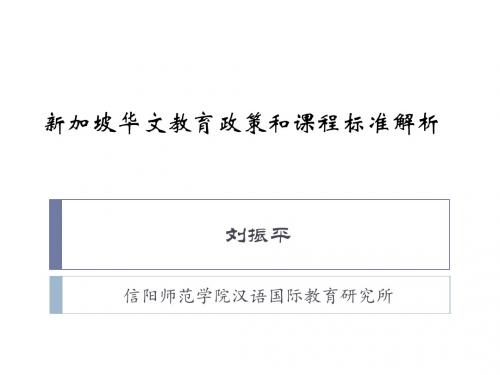
新加坡政府在双语教育政策的制定上,最初主要是出于 国家生存、政治现实和经济发展上的考量,而后则逐步 注入了“因材施教、量体裁衣”的教育理念,为来自不 同家庭语言背景、不同能力、不同兴趣,以及不同智力 水平的学生“量身定制”课程、教学法和评估方式等, 真正从学生个体情况和需求出发,以学习者为本位。
(一)培养语言能力。 (二)提高人文素养。
(三)培养通用能力。
二、新加坡小学华文教学与中国小学的汉语母语教学
相同点:
(1)具有强制性。(现行的《中国人民共和国教
育法》(1995年颁布)第十八条规定公民有义务的 接受义务教育。)
(2)同样都有培养语言能力、提高人文素养和培
养通用能力的目标。
二、《吴庆瑞报告书》:因材施教理念的初步实施
20世纪70年代,新加坡的经济进入了腾飞阶段,在克服 了建国之初迫切的生存问题之后,新加坡政府更加关注 教育问题。1975年,国防部对一群受英文教育、中四会 考及格的国民服役人员的英文识字水平进行了调查,结 果显示只有11%的人在工作和训练的时候能应用自如地 使用英语(Goh Keng Swee,1979)。推行了将近20年 的双语教育,成效却令政府相当沮丧,教育改革迫在眉 睫。于是,吴庆瑞受委托对新加坡教育体制和教育部内 部运作进行检讨。
政治上: 当时出台各族学习族群母语和以马来语作为国语的政 策,则更多的是出于政治上的考量。作为一个多元种 族、多元文化的国家,为了使人民能够保留自己的文 化和传统价值观,各种族势必还要学习族群母语。而 从地理位置上看,新加坡处于以马来族穆斯林为主的 区域中,保留马来语为国语,无疑更有利于容身于这 样的环境之中。
令人欣喜的是,虽然当时的教育政策以服务政治、经 济发展为主,但似乎也有了因材施教理念的影子。 1963年颁布的《新加坡教育调查委员会报告书》(即 《林溪茂报告书》)中强调应对学生所掌握的第一语 文和第二语文的实际水平有所区分,应鼓励那些第二 语文学习能力比较高的学生学习更高水平的第二语文, 并鼓励他们在中四时选考一门第二语文。(Singapore, 1964)这是符合因材施教的理念的。然而,遗憾的是, 这一点在当时并没有得到重视,因而也就没有得到很 好的贯彻执行。
《新加坡建国之路小红点,大格局》解读

Urban Transport of China Vol.19No.2March 2021城市交通二○二一年第十九卷第二期《新加坡建国之路:小红点,大格局》由新加坡宜居城市中心于2016年出版,主编刘太格博士有“新加坡规划之父”的美誉。
本书以人物访谈的形式,记叙了概念规划、市区重建、公共住宅计划、樟宜机场建设、花园城市建设、产业经济发展等重大历史转折的来龙去脉。
小红点意指新加坡(The little reddot),大格局则指远大的愿景(An extensive strategic vision)。
本书以关键事件和关键人物两条线索展开。
关键事件线索梳理新加坡50年建国史中的里程碑事件,剖析了重大决策背后的挑战与应对、取舍与考量。
关键人物线索聚焦13位建国先驱,回忆他们在各自领域的工作,鼓舞后辈继承先辈的优秀品质。
李光耀世界城市奖全书内容可概括为三大关键词:汲取知识,提炼原则,分享经验。
这也是宜居城市中心的成立初衷。
宜居城市中心由新加坡国家发展部和环境水利部于2008年联合成立。
次年,其与市区重建局联合设立了被喻为城市规划界诺贝尔奖的“李光耀世界城市奖”。
至今已有5座城市获此殊荣,分别是西班牙毕尔巴鄂、美国纽约、中国苏州、哥伦比亚麦德林和韩国首尔。
2014年,中国苏州凭借“保护古城、建设新区”的可持续城市发展战略获奖。
2018年,韩国首尔凭借2030总体规划中的“广泛公众参与”获奖。
李光耀世界城市奖根据可持续性、宜居性、城市活力和生活质量4个主旨进行评选。
这4个主旨是新加坡城市发展丰富多姿实践的总结,进而形成了本书的核心理念——城市宜居度框架。
城市宜居度框架城市宜居度框架重点关注建设可持续发展的环境、营造高质量的生活、打造具有竞争力的经济三大关键内容。
1)建设可持续发展的环境,以1971年和1991年概念规划为代表。
英国殖民政府1958年编制的总体规划因水土不服,难以解决新加坡人口激增、住房紧缺等问题。
小学英语词汇

pep实验教材新加坡版:三年级上册英语单词Unit 1cat monkey duck dog panda bear pig rabbit bird mouseUnit 2bag book pen pencil glue scissors eraser sharpener rulerpencil-boxUnit 3nose eye face mouth head ear neck arm hand leg knee footUnit 4doll ball kite balloon car bus bike taxi train ship plane boatUnit 5red blue green yellow purple brown white black pink orange greyUnit 6hamburger hot dog Coke cake egg orange pear apple banana milk juice water noodles rice chicken三年级下册英语单词Unit 1school classroom storybook water bottle marker crayonChinese book English book desk chairUnit 2one two three six seven eight nine ten four five eleven twelveUnit 3father(dad) mother(mum) brother sister daughter son grandfather(grandpa) grandmother(grandma) uncle auntUnit 4mango bread candy doughnut coffee fruit grapes honey ice cream jamUnit 5kangaroo lion mosquito nest owl parrot quail rooster elephant tigerUnit 6skirt T-shirt uniform vest watch box yacht zip zebra coat sweater四年级上册英语单词Unit 1China America England Singapore Canadafriends boy girl student driverteacher farmer doctor nurse postmanUnit 2class grade one two three four thirteen fourteen five six fifteen sixteen seven eight seventeen eighteen nine ten nineteen twentyUnit 3pineapple lemon apple pear watermelon kiwifruit orange banana potato tomato carrot cucumber eggplant green pepperUnit 4fine nice kite warm cool panda hot cold water sunny cloudy windy skirt rainy snowy shirtUnit 5cap hat T-shirt dress blouse jacket raincoatsweater jeans trousers vest socks shoesUnit 6big small long tall short fat thin new happy四年级下册英语单词Unit 1home bed bedroom computer desk chair living room armchair sofa TV ball balloon kitchen table sandwich cake hamburger floor mug cup wall window picture clockUnit 2get up brush(your)teeth wash(your)face have(your)breakfast egg milk maths class Chinese English lunch French fries pizza hot dog Coke dinner pork beef rice chicken put away watch TV go to bed pen pencilUnit 3twenty-one twenty-two twenty-three twenty-four twenty-fivetwenty-six twenty-seven twenty-eight twenty-nine eleven twelve thirty forty fifty student teacher music art PE class maths subject science listen do speak sing play actUnit 4week day Sunday today Monday Tuesday Wednesday Thursday sports Friday Saturday weekend park theme parkUnit 5picnic sausage chocolate bread juice drawing painting singing reading dancing jogging exercising swimming roller skating skateboarding skating notebook exercise book shopping ruler pencil-boxUnit 6zoo the Great Wall park giraffe goose geese swan duck peacock crane turkey neck leg teacups merry-go-round roller coaster bumper car car bike cable car coach fruit water五年级上册英语单词Unit 1Britain Australia New Zealand friend I am I’m=I am road street what is what’s=what is your my name my name’s=my name is grade you in clever quiet pretty her his eye nose mouthUnit 2smart active shy funny how old are he she he’s=he is she’s=she is Japan France Germany where from China piano book we like shopping paintingUnit 3tailor taxi driver writer actress actor this father mother brother sister singer dancer dentist dad mumdoctor nurse a fireman policewoman waitress waiterwho who’s=who is farmer policemanUnit 4bus conductor reporter vet bus driver son daughterhotel hospital bank hi hello they grandfather grandmothersend letter newspaper interview people grow wheat vegetable teach love help kind beautifulUnit 5it schoolbag activity book dictionary eraser sharpener yesno not isn’t=is not seal whal e hippo dolphin that cat dog bear umbrella mirror belt mop coat jacket jeans shoesUnit 6camera video camera sun visor scarf TV box watchpicture knife fork spoon plate pudding soup cupmug pizza ice cream these puppet drum candleface paint paper chain doll五年级下册英语单词Unit 1a horse foal cow calf monkey goat kid sheep lamb rabbit bird cub joey lion tiger elephant mouseUnit 2hen chick duckling geese gosling rooster those kittenpuppy piglet the baby pig jump through ring rideclimb ladder animal can want walk runUnit 3school classroom library borrow make thing welcome to our experiment listening observe speaking have week please great club violin listen draw paint sing dance manyUnit 4there corner project work study plant printing on paper speak read write football basketball volleyballhockey rugby exercise any game for boy girl friend trip trip forest social work tree flower lesson very interestingUnit 5comb toothbrush toothpaste soap towel sure here buy tape CD VCD walkman fifty-five sixty radio seventy recorder eighty shorts swimming trunks sandals sports shoes much how much ninety hundredUnit6fever stomachache headache toothache cough problem concert ill bad cold thank elbow hurt open lower head move face ear arm hand foot get-well card grapefruit cherry strawberry some grape六年级上Unit1:Carefully ask question actively don’t = do not make noise eatShould shouldn’t=should not go early mess make a mess room keep clean set home go home too late look look out mustWait respect and them good take good care of young children keep off grass mustn’t = must not cross now spit ground litterUnit2go to school at morning in the morning AM=in the morningPM=in the afternoon get up get home cinema go to the cinemaGo out evening in the evening stay up late usually officeBegin meet other scientist always meal often sometimes seldom never afternoon in the afternoonUnit3Hobby collect toy stamp paper card tale tennis football basketball grandpa enjoy farming fishing tool flower raising I’ll = I will first then get paint house cut yellow green blue redUnit4Will come party October second third fourth fifth sixthSeventh eighth ninth tenth birthday jelly biscuit would shape triangle square round rectangle get chocolate wouldI’d= I would a cup of tea glass a glass of a piece of wishBlow blow outUnit5January month year February March April May June JulyAugust September November DecemberUnit6Spring season seed land fly fly kites go camping hotSummer rainy beach look for shell sandcastle feed snow sweep play with snow pick snowman autumn winter六年级下册英语单词Unit 1was holiday wonderful were during exciting fantastic yesterday last shop bookshop bookstore about museumat home born when age date birth time place grandmaUnit 2about tell ago fast live million slowly meat learn talk man Peking Man cave use clothes fur stone kill fire cook wall on Tree Planting Day sunny Mother’s Day plant dig hole waterUnit 3near in front of building restaurant between post office hairdresser next to supermarket across right left straight along turn bank hotel nice excuse me city library take shopping centre food stall on foot subway by busUnit 4ship train we’re=we are vis it the Great Wall the Ming T ombs palace the Summer Palace the Forbidden City Peking Opera London map world Big Ben Tower Bridge TorontoCN Tower Niagara Falls Sydney Sydney Opera House DisneylandUnit 5waste too cut down energy clear hunt river lake more dirty save cotton turn off light wild rubbish leave throw plastic everywhere clean paper keep try protect platypus African koala gorilla fastUint 6a lot textbook radio programme around reference us me internet study toy photo take photos famous be together pair group an each other polite。
小升初知识点总结复习(素材)通用版英语六年级下册
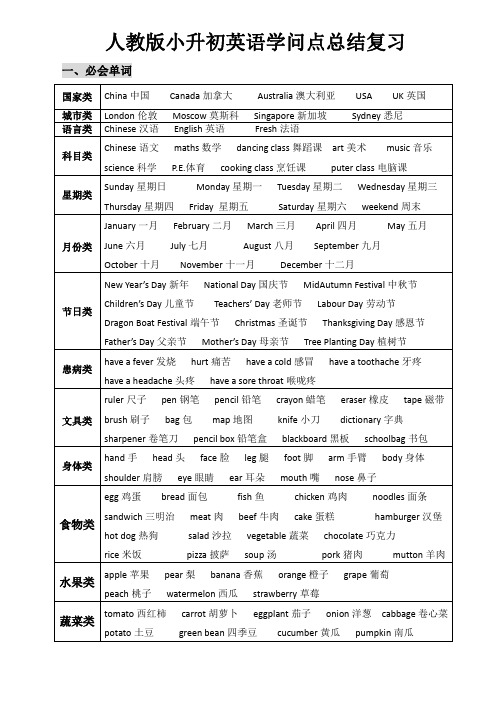
一、必会单词
国家类 China 中国 Canada 加拿大
Australia 澳大利亚 USA UK 英国
城市类 London 伦敦 Moscow 莫斯科 Singapore 新加坡
语言类 Chinese 汉语 English 英语
Fresh 法语
Sydney 悉尼
科目类 Chinese 语文 maths 数学 dancing class 舞蹈课 art 美术 music 音乐
go cycling 去骑自行车
in front of 在...前面
fly a kite 放风筝
lots of 很多
go boating 去划船
eat breakfast 吃早饭
go straight 直走
eat lunch 吃午饭
have a cold 感冒
eat dinner 吃晚饭
pay attention to 留意
science 科学 P.E.体育 cooking class 烹饪课
puter class 电脑课
星期类 Sunday 星期日
Monday 星期一 Tuesday 星期二 Wednesday 星期三
Thursday 星期四 Friday 星期五
Saturday 星期பைடு நூலகம் weekend 周末
January 一月 February 二月 March 三月 April 四月
tall 高的 short 矮的 fat 胖的 thin 瘦的 healthy 健康的 good 好的
外貌类 beautiful 美丽的 pretty 美丽的 nice 好的 strong 强壮的 old 老的
最新少儿英语教材YippeeNewPPT介绍原版进口英语教材
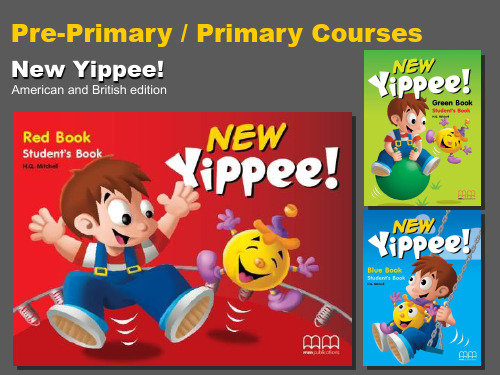
Methodology
Yippee is based on the Multiple Intelligence Theory, which holds that each person perceives and understands the world differently. As a result, not all learners learn in the same way.
Pre-Primary / Primary Courses
New Yippee!
American and British edition
1
Designed for young learners (3-7 years old).
2
Aim
It helps children learn English the same way that native speakers do – by listening and speaking first, before they learn to read and write.
step-by-step guide to each lesson
25
listening transcripts indicating the exact track number
Flashcards
26
Flashcards
27
Interactive Whiteboard Material
Extra activities are also included
Moral Value
19
Yippee Blue SB Unit
Revision 7-8
extra practice of the items presented in the two previous modules
新加坡小学一年级英语试PRACTICE 7(通用)

PRACTICE 7Vocabulary (30 marks)(A) Fill in the blanks with the appropriate words. (10*2=20 marks)ribbon trunks windy mountains sunglasses medicine clown thirsty envelope examination1.Menghua is sick.He has to take ____________.2.The afternoon sun is glaring.Mrs Lim is wearing a pair of ___________.3.The ___________ in China are so beautiful.4.You have to study hard for your coming_____________.5.Peter changes into his swimming ___________before jumping into the pool.6.It's a ___________ day.Let's fly kites.7.The __________ is so funny.He makes everyone laugh.8.Meimei has a pretty __________ on her hair.9.I am feeling ___________.Please give me a drink.10.Ivy needs an _________ for her letter.(B) Fill in the blanks with the correct words. (10*1=10 marks)11. This is a _____________.(teacher, witch, clerk)12. She is flying on a ____________.(dustpan, toothbrush, broom)13. My dog has just given birth to a litter of____________.(kittens, puppies, nestlings)14. They are small and ____________.(cute, stupid, foolish)15. This is my new _____________.(blouse, skirt, dress)16. My mother ___________ it.(sewed, slept, slapped)17. I read this book many times.It is very ________________.(boring, interesting, silly)18. I borrowed it from the _____________.(museum, library, emporium)19. Tenzin likes to eat chicken ___________.(drumsticks, sponges, bones)20. They are _____________.(bitter, delicious, tasteless)Grammar (40 marks)(C) Underline the correct word in each of the brackets.(16 * 1 = 16 marks)21. I (was, were) naughty when I was younger.22. We (was, were) talking about you yesterday.23. She (was, were) not in school last week.24. The children (was, were) at the canteen at one o'clock.25. His cats (was, were) sleeping under the table last night.26. He (was, were) fat when he was a baby.27. They (was, were) very quiet when their teacher scolded them.28. You (was, were) shorter than me last year.29. My wallet (was, were) in the cupboard yesterday.30. The night (was, were) beautiful and we sat by the beach singing.31. Her dog (was, were) sick last week.32. Diana and I (was, were) classmates last year.33. My parents (was, were) happy when I showed them my results.34. We were thirsty and the water (was, were) not enough for us.35. The music (was, were) good and we enjoyed it very much.36. Susie and Janet (was, were) in the library a while ago.(D) Rearrange the words to form correct sentences and end each sentence with a full-stop or with a question mark. (7*2=14 marks)37. to teacher stop the asked her students talking______________________________________________________________________ 38. bowls he rice ate was two so hungry he of that______________________________________________________________________ 39. run Thomas than can faster Jimmy______________________________________________________________________ 40.kind we and others should helpful to always be______________________________________________________________________ 41. very nobody because likes to rude is sit beside him he______________________________________________________________________ 42. takes care he pets good of his ______________________________________________________________________ 43. likes to when free chess he is father play______________________________________________________________________ (E) Complete the sentences by using the helping words. (5*2 = 10 marks)Why is he laughing?It is because the ______________________________.How many months are there in a year?There are ______________________________________.When did you feed the cat?I ______________________________________________.Do you water the plants daily?No, I __________________________________________.Where do you put the books?I ______________________________________________.(F) Comprehension (5*2=10)Read the passage carefully and answer the questions that follow.Yesterday was Children's Day. Meiqing was very excited. She knew that her teacher, Miss Lee, would give them presents. She did not bring any books to school. There was no lesson. Her mother baked a mango cake for her class. Every child had to bring some food for the Children's Day party. After the feast, Miss Lee played a few games with the children. Before the party ended, each child was given a present. Meiqing got a drawing book. She was happy because she liked to draw.49. Why was Meiqing excited on Children's Day?_____________________________________________________________________ 50. Why did Meiqing bring a mango cake to school?_____________________________________________________________________ 51. Who baked the mango cake?_____________________________________________________________________ 52. What did the children do after eating the food?_____________________________________________________________________ 53. Why was Meiqing happy to get a drawing book as a present?_____________________________________________________________________(G) Written Expression (20 marks)Look at the picture and write a story about it. Use the helping words given below.Test________________________________________________________________________ _________________________________________________________________________________ _________________________________________________________________________________ _________________________________________________________________________________ _________________________________________________________________________________ _________ANSWERS(Primary 1 English)Practice 7A.1. medicine2. sunglasses3. mountains4. examination5. trunks6. windy7. clown8. ribbon9. thirsty 10. envelopeB.11. witch 12. broom 13. puppies 14. cute 15. dress16. sewed 17. interesting 18. library 19. interesting 20. deliciousC.21. was 22. were 23. was 24. were 25. were 26. was27. were 28. were 29. was 30. was 31. was 32. were33. were 34. was 35. was 36. wereD.37. The teacher asked her students to stop talking.38. He was so hungry that he ate two bowls of rice.39. Thomas can run faster than Jimmy.40. We should always be kind and helpful to others.41. Nobody likes to sit beside him because he is very rude.42. He takes good care of his pets.43. Father likes to play chess when he is free.E.44. It is because the jokes are funny.45. There are twelve months in a year.46. I fed it last night.47. No, I do not water the plants daily.48. I put them on the shelf.F.49. She knew that Miss Lee would give them presents.50. Every child had to bring some food for the Children's Day party.51. Meiqing's mother did.52. They played a few games.53. Meiling was happy because she liked to draw.。
新加坡小学英文教材1
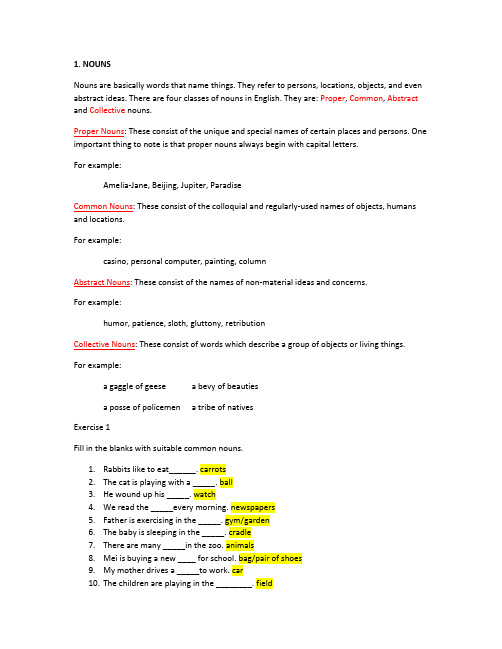
Nouns are basically words that name things. They refer to persons, locations, objects, and even abstract ideas. There are four classes of nouns in English. They are: Proper, Common, Abstract and Collective nouns.Proper Nouns: These consist of the unique and special names of certain places and persons. One important thing to note is that proper nouns always begin with capital letters.For example:Amelia-Jane, Beijing, Jupiter, ParadiseCommon Nouns: These consist of the colloquial and regularly-used names of objects, humans and locations.For example:casino, personal computer, painting, columnAbstract Nouns: These consist of the names of non-material ideas and concerns.For example:humor, patience, sloth, gluttony, retributionCollective Nouns: These consist of words which describe a group of objects or living things.For example:a gaggle of geese a bevy of beautiesa posse of policemen a tribe of nativesExercise 1Fill in the blanks with suitable common nouns.1.Rabbits like to eat______. carrots2.The cat is playing with a _____. ball3.He wound up his _____. watch4.We read the _____every morning. newspapers5.Father is exercising in the _____. gym/garden6.The baby is sleeping in the _____. cradle7.There are many _____in the zoo. animals8.Mei is buying a new ____ for school. bag/pair of shoes9.My mother drives a _____to work. car10.The children are playing in the ________. fieldFill in the blanks with suitable proper and abstract nouns.1.My elder____, Mary is rather lazy. sister2.She shows____ and care for the juniors. love3.John is my _____. brother/friend4.London Bridge is in_____. London/United Kingdom5.Mrs. Tan _____ for her children. is looking/cares6.I scolded my sister out of _____. anger7.Mr. Tanaka is from_____. Japan/Tokyo8.The ____ is performing magic. magician9.The bull’s ___ are sharp. horns10. She is playing with the cute ____. puppy。
新加坡小学英语教材MyPalsareHere英语国际版介绍

My Pals Are Here! English (International Edtion 国际版)教材构成:Textbook(课本), Workbook(练习册), Teacher’s Guide(教师指南), Audio CD(CD光盘), Grammar Practice(语法练习), English Tests(测试手册), Homework(家庭作业),教材开发的范围和结果符合大多小学英语大纲的要求,教材的设计目的是依据小学1-6年级学生的身心发展及认知能力所编辑,与国际英语课程纲要相呼应。
内容编排融合听、说、读、写、自然发音,任务式导向学习法(Task-Based Learning)的设计理念,让学生更能运用所学融会贯通。
课程衔接完善,满足教与学全方位需求,多元化的主题和具挑战性的教学活动,有助学生创造力与自我发展。
让准备参加国际学习或者考试的学生在英语方面取得好成绩。
Key Stage 1 (lower primary): LEARNING TO READ关键阶段1 (小学低年级):学习中阅读Learning to Communicate in English 学会用英语沟通Entry level competency: assumes zero English literacy.入门级的能力:零起点。
Primary Outcome: Pupils will use English to communicate in social and school settings.主要成果:小学生将学会在社会和学校环境中使用英语进行交流。
Key Stage 2 (upper primary): READING TO LEARN关键阶段2 (小学高年级):阅读中学习Learning to Learn in English 学会用英语学习Primary Outcome: Pupils will use English to achieve academically in contents areas.主要成果:小学生将学会使用英语学习学科知识。
小学生Singapore新加坡ppt介绍

introduce my most loving country--Singapore.
Page 1
Welcome to Singapore 欢迎来到新加坡
Page 2
国家简介(National introduction)
Singapore is one the richest countries in the world.
这是新加坡的唐人街, 它被现代购物中心、 百年老店占据。
Page 6
Singapore's tourist attractions also include :Universal Studios Singapore,Sentosa,clarke Quay and so on. 新加坡旅游景点还包括:新加坡环球影城,圣淘沙岛,克 拉码头等等。
Merlion is located in the city of Singapore River,is the sign and symbol of singapore.
鱼尾狮像坐落于市内新 加坡河畔,是新加坡的 标志和象征。
Page 5
牛车水 China Town
This is Singapore's Chinatown , it is a modern shopping center , a hundred years to occugapore is the
important financial、
service and shipping
新加坡是全球最为富裕的国家之一。新
centers.
加坡是亚洲重要的金融、服务和航运中
心之一。
Page 3
新加坡教育体系
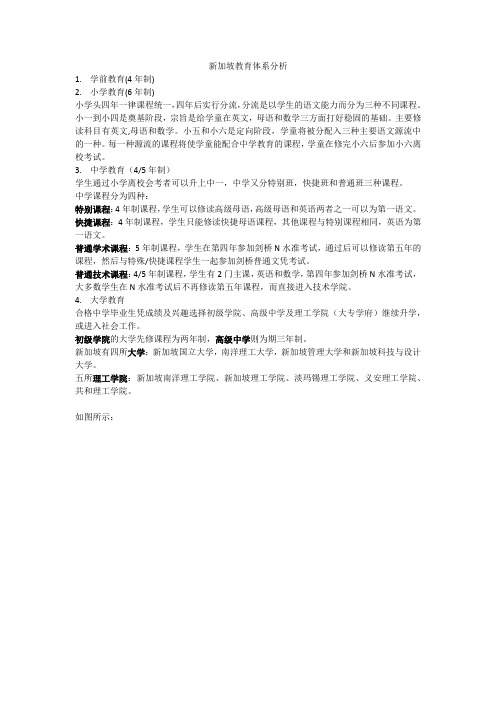
新加坡教育体系分析
1.学前教育(4年制)
2.小学教育(6年制)
小学头四年一律课程统一,四年后实行分流,分流是以学生的语文能力而分为三种不同课程。
小一到小四是奠基阶段,宗旨是给学童在英文,母语和数学三方面打好稳固的基础。
主要修读科目有英文,母语和数学。
小五和小六是定向阶段,学童将被分配入三种主要语文源流中的一种。
每一种源流的课程将使学童能配合中学教育的课程,学童在修完小六后参加小六离校考试。
3.中学教育(4/5年制)
学生通过小学离校会考者可以升上中一,中学又分特别班,快捷班和普通班三种课程。
中学课程分为四种:
特别课程:4年制课程,学生可以修读高级母语,高级母语和英语两者之一可以为第一语文。
快捷课程:4年制课程,学生只能修读快捷母语课程,其他课程与特别课程相同,英语为第一语文。
普通学术课程:5年制课程,学生在第四年参加剑桥N水准考试,通过后可以修读第五年的课程,然后与特殊/快捷课程学生一起参加剑桥普通文凭考试。
普通技术课程:4/5年制课程,学生有2门主课,英语和数学,第四年参加剑桥N水准考试,大多数学生在N水准考试后不再修读第五年课程,而直接进入技术学院。
4.大学教育
合格中学毕业生凭成绩及兴趣选择初级学院、高级中学及理工学院(大专学府)继续升学,或进入社会工作。
初级学院的大学先修课程为两年制,高级中学则为期三年制。
新加坡有四所大学:新加坡国立大学,南洋理工大学,新加坡管理大学和新加坡科技与设计大学。
五所理工学院:新加坡南洋理工学院、新加坡理工学院、淡玛锡理工学院、义安理工学院、共和理工学院。
如图所示:。
新概念一39-40课PPT课件

2021/6/4
11
show [ʃəʊ]v.给...看
show sb.sth=show sth.to sb. 我打算给你们看几幅漂亮的图片。
I am going to show you some beautiful pictures. I am going to show some beautiful pictures to you.
Lesson 39 Don’t drop it!
2021/6/4
1
1.工作 2.努力地 3.锤子 4.上漆,涂 5.最喜欢的 6.做作业 7.听 8.盘子
2021/6/4
Review
9.睡觉 10.清洗 11.扫 15.孩子们 a.请把那把锤子拿给我。 b.你打算把它漆成什么颜色? c.粉红色是她最喜欢的颜色。
show n.表演
fashion show时装秀
talk show脱口秀
2021/6/4
12
send[send]v.送给 send sb. sth.=send sth.to sb.
我打算把这束花送给Sally. I am going to send Sally these flowers I am going to send these flowers to Sally.
2
be going to +动原
①事先经过考虑,安排近期要做的事情。 ②根据目前某种迹象判断某事非常有可能发生。
肯定句:主语+ be going to + 动词原形+其他.
否定形式:主语+be not + going to +动词原形+其他.
小声讲话的英文
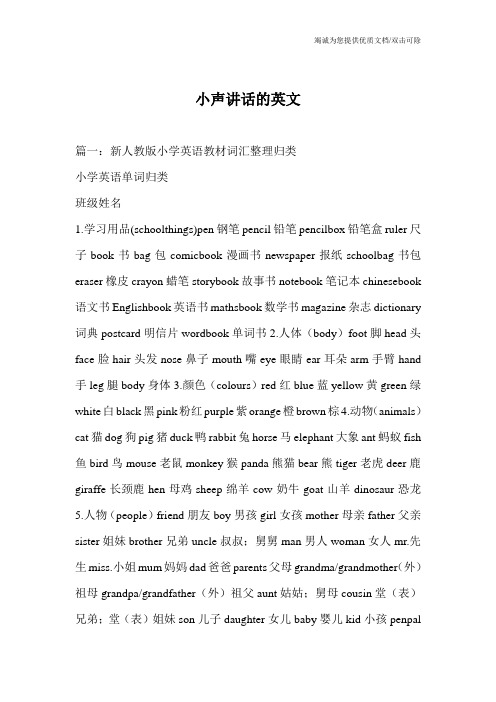
pants长裤socks袜子shoes鞋子sweater毛衣coat外套,衣大shorts短裤hat(有沿的)帽子cap帽子scarf围巾gloves手套
10.交通工具(vehicles)
bike自行车bus公共汽车train火车boat小船ship轮船car小汽车taxi出租车plane飞机subway地铁11.杂物(otherthings)window窗户door门desk课桌chair椅子bed床computer计算机blackboard黑板fan风扇light灯teacher'sdesk讲台picture图画;照片wall墙壁floor地板football足球lamp台灯phone电话sofa沙发fridge冰箱table桌子TV电视key钥匙photo照片plate盘子knife刀fork叉spoon勺子bowl碗chopsticks筷子gift礼物toy玩具ball球balloon气球kite风筝umbrella伞e-mail电子邮件trafficlight交通灯sunglasses太阳镜box盒子clock时钟plant植物waterbottle水瓶photo照片12.地点(locations)room房间bedroom卧室bathroom浴室livingroom起居室kitchen厨房study书房factory工厂naturepark自然公园sciencemuseum科学博物馆supermarket超市theGreatwall长城country国家village乡村city城市park公园postoffice邮局hospital医院cinema电影院bookstore书店farm农场zoo动物园garden花园school学校classroom教室playground操场dininghall饭厅library图书馆teacher'soffice教师办公室gym体育馆firstfloor一楼secondfloor二楼artroom美术教室computerroom计算机教室musicroom音乐教室13.国家城市(countries&cities)china中国america/USa美国UK英国canada加拿大australia澳大利亚newYork纽约London伦敦Sydney悉尼moscow莫斯科world世界Singapore新加坡14.天气(weather)cold寒冷的hot热的、烫的warm温暖的cool凉爽的snowy下雪的sunny晴朗的rainy下雨的windy有风的cloudy多云的weatherreport天气预报15.景物(nature)river河流lake湖泊forest森林house房子bridge桥building建筑物mountain山village村庄tree树hill小山flower花grass草leaf叶子16.星期(week)monday星期一Tuesday星期二wednesday星期三Thursday星期四Friday星期五Saturday星期六Sunday星期日weekend周末17.月份(months)Jan.(January)一月Feb.(February)二月mar.(march)三月apr.(april)四月may五月Jun.(June)六月Jul.(July)七月aug.(august)八月
新版剑桥少儿英语一至三级 全 大讲义修订稿

新版剑桥少儿英语一至三级全大讲义文档编制序号:[KKIDT-LLE0828-LLETD298-POI08]剑桥少儿英语剑桥少儿英语是资深的国际权威考核机构——英国剑桥大学考试委员会(University of Cambridge Local Examinations Syndicate,简称UCLES),为培养、提高英语为非母语国家少年儿童的英语能力而精心设计的,它为6—12岁少年儿童提供了一个全方位的教学评测方案,为他们走进英语世界迈出良好的第一步。
剑桥少儿英语分为:预备级(Pro-Starters)、一级(Starters)、二级(Movers)和三级(Flyers)。
预备级:适合5-6岁,经过大约80小时的英语学习,掌握约280个词汇的学生参加,预备级考试只设口试,无听力和读写内容;剑桥少儿英语考试一级(Starters):一级:适合6-8岁,经过大约100小时的英语学习,掌握约460个词汇的学生参加(07版剑桥考试大纲词汇量为459个,旧版剑桥考试大纲词汇量为439个);剑桥少儿英语考试二级(Movers):二级:适合8-11岁,经过大约100小时的英语学习,掌握约770个词汇的学生参加(07版剑桥考试大纲词汇量为772个,旧版剑桥考试大纲词汇量为674个);剑桥少儿英语考试三级(Flyers):三级:适合9-12岁,经过大约150小时的英语学习,掌握约430个词汇的学生参加(07版剑桥考试大纲词汇量为427个,旧版剑桥考试大纲词汇量为398个)。
考试大概内容:读写(Reading and Writing )这个部分是个笔试部分,时间为:20分钟(一级)到40分钟(三级)。
文字篇幅比较短小,由一些固定内容的单词和结构组成。
考生只需要进行简单的操作如选择和打勾,用单词和短语填空,回答灵活性的问题。
试卷被送往剑桥大学考试委员会打分。
听力(Listening)这个部分也是一个笔试部分。
时间为:20分钟(一级和三级),25分钟(二级)。
